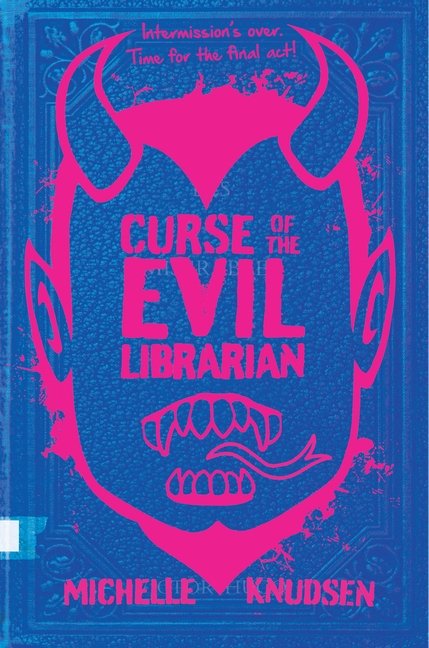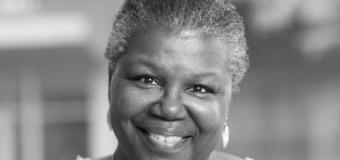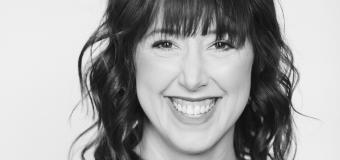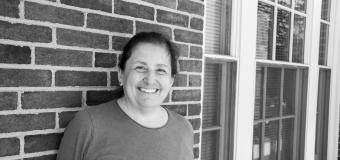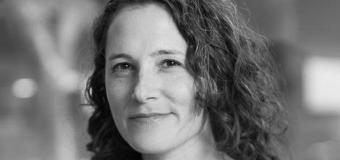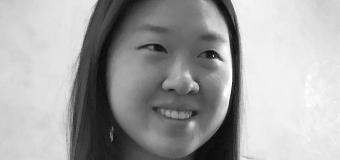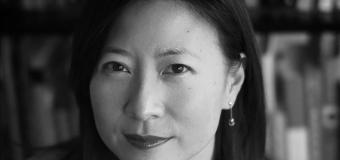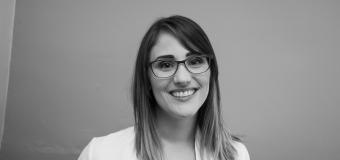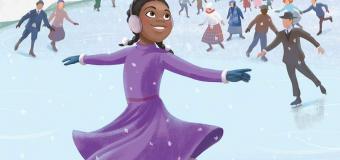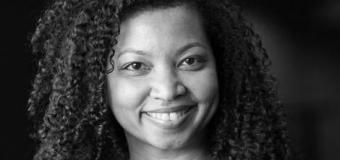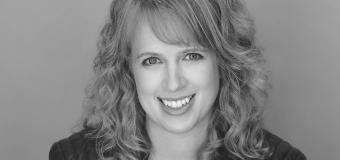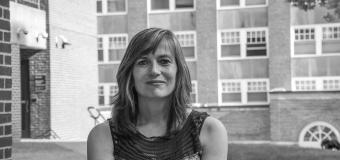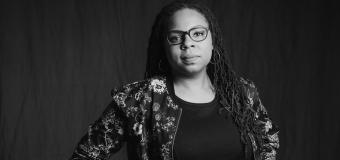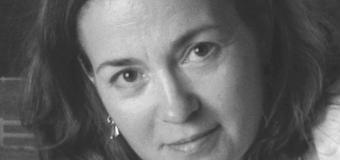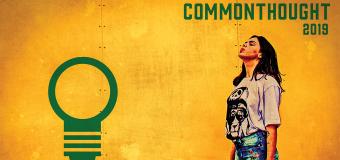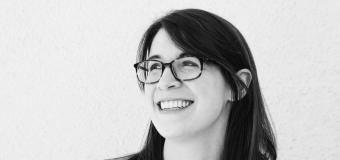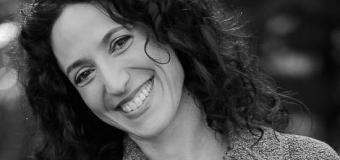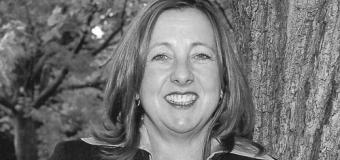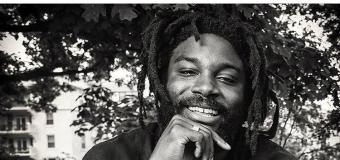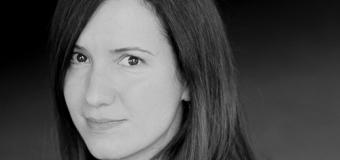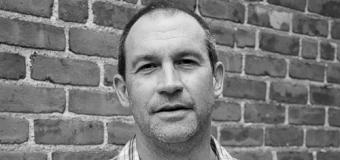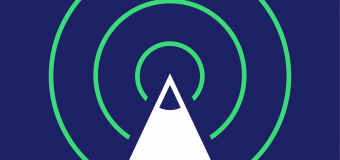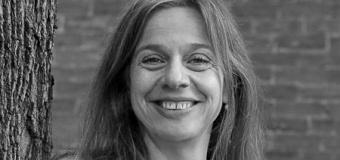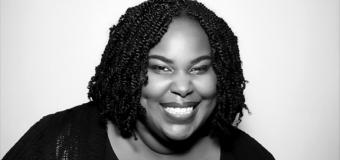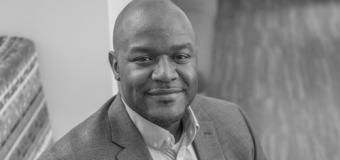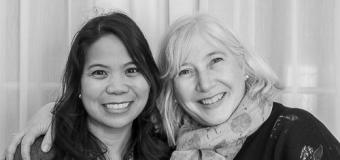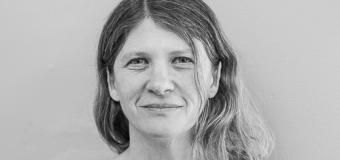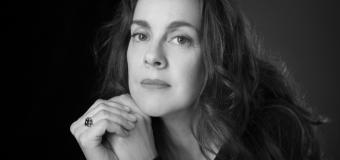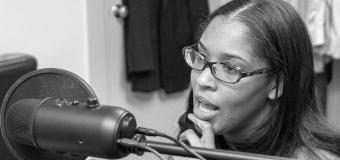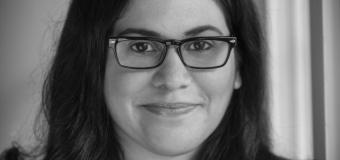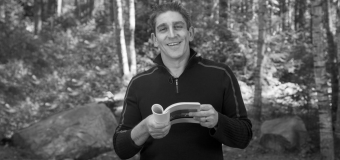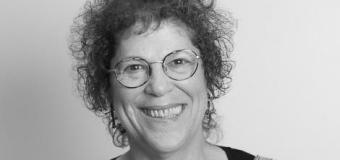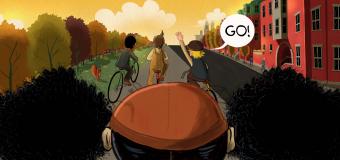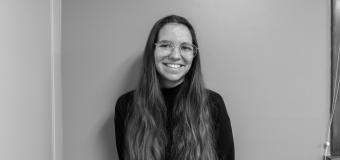Georgia Sparling: This is Why We Write, a podcast of Lesley University. Each week, we bring you authors from the Lesley community to talk about books, writing, and the writing life. My name is Georgia Sparling, and today, I'm speaking with Michelle Knudsen. Michelle is a faculty member in our low residency MFA in Creative Writing Program and is a New York Times best-selling author with 47 books for young readers, including board books, picture books, early readers, and middle-grade and young adult novels. Her most recent book is the conclusion of her Evil Librarian trilogy, which we'll talk about today. Thank you so much for being on the show today, Michelle.
Michelle Knudsen: Thanks for having me.
Georgia: First off, in keeping with the title of this podcast, why do you write? What got you started?
Michelle: I think, like a lot of writers, I was a reader first. I was such a reader that I couldn't think of anything else that I would want to do when I grew up other than become an author myself, although originally I thought-- I grew up on science fiction and fantasy almost exclusively, so my first plan was to become an adult-fantasy author and write big, giant, door-stopper novels.
Georgia: That's great.
Michelle: Another world. I kind of fell into children's books by accident, but it's sort of a perfect blend of all the things that I like because I still get that wide sort of field of “anything goes” that exists in fantasy. I do write fantasy for kids, but I also get to write other stuff too. It wasn't exactly the plan that I envisioned, but it definitely grew out of that initial fascination with science-fiction and fantasy novels.
Georgia: Okay. That's great. I'm a little behind on your 47 books. I admit I've read three.
[laughter]
I've got a lot of work cut out for me.
Michelle: Some of them are very short.
Georgia: Yes, I can knock a few out an afternoon. I have read the three books in your Evil Librarian series, and for those who maybe have not been introduced to it yet, it's the Evil Librarian, Revenge of the Evil Librarian, and Curse of the Evil Librarian which just came out in August. I would say that they are really humorous. They're kind of horror-lite, so I was wondering would you tell our audience a little bit about the books. We'll both try not to give away too many spoilers.
Michelle: Okay. In the first book, the main character Cyn, which is short for Cynthia, is the tech director of the school musical which is Sweeney Todd. She's got what she believes is a hopeless crush on Ryan, the guy who's playing Sweeney in Sweeney Todd, and a best friend who teases her about it but then develops a crush on the new librarian. The best friend develops a crush on the new high school librarian, who is this young, attractive man, very handsome. Unfortunately, he turns out to be an evil demon. You find this out very early.
Georgia: Bummer.
Michelle: This not a spoiler.
[laughter]
Michelle: The title kind of hints at it.
Georgia: Yes, it gives that away a little bit.
Michelle: Yes. He's actually a demon, not an actual human man, there to sort of suck out the life forces of all the kids in the school as part of his plan to get the demon throne in the underworld. Her best friend is sort of possessed and brainwashed thinking that she's falling in love with this librarian who is not a librarian, and she's not actually in love, and she's sort of under this spell. Cyn has to find a way to save her friend, save the school, also save the school musical and hopefully make some progress with her love interest, who does of course get wrapped up in all the demon stuff.
Georgia: Naturally [chuckles].
Michelle: Yes, of course. I think horror-lite is probably a good description. I usually describe it as a YA, funny, romantic, musical theater adventure comedy. Did I leave out something in there? There's usually a string of adjectives. It's got a lot. It's got a lot going on, but it's more funny than scary.
Georgia: Definitely. I didn't have to put the book in the freezer at any point in time.
[laughter]
Georgia: These were your first YA books. Is that correct?
Michelle: Yes.
Georgia: What caused you to move into that genre, whereas your other books have been for younger readers, right?
Michelle: Right. These books-- Let's see. The first Evil Librarian book was my- I should know this -my fourth novel or my third novel. I was writing it sort of the same time I was writing the third book in my middle-grade trilogy. I think that one came out after. It's one of those. It wasn't really a plan to move into YA. It was sort of just the idea that came to me happened to be set in high school, and that's automatically a young adult audience. That's sort of how most of my story ideas go. I don't sort of think, "All right, now I'm going to sit down and write this kind of book". The idea sort of starts, and it becomes clear whether this is going to be targeted at older readers or younger readers or very young readers.
I was interested in writing YA, but I didn't sit down being like, "Okay, I'm going to think of a YA story". It just happened to be the way it went.
Georgia: Were there any unique challenges with moving into this age category?
Michelle: The biggest challenge actually was that it was set in the real world. Even though it's supernatural and a lot of unbelievable things happen, it was the first time I was writing a story for a novel set here. There was a lot of research of checking in with my friends from high school, checking in with my friends from theater camp, which is where the second book takes place, talking to my friends who have high-school-aged kids and asking them, "Is this how it works still?"
Georgia: Yes [laughs].
Michelle: There were so many details to get right, which I hadn't had to worry about when I'm making up the whole world. I still have to keep track of everything, but it's a little different.
Georgia: Right, but you set the rules whereas this, there's already some rules set up.
Michelle: Right, and I didn't want to-- If you get something wrong, it's the easiest way to pull someone right out of a book because they're just like, "You don't know what you're talking about".
Georgia: Yes, and teenagers are pretty harsh critics, I'd say [chuckles].
Michelle: Yes, yes. That happened to me watching Mr. Robot. Have you watched Mr. Robot?
Georgia: I haven't watched it yet.
Michelle: I'm just watching the first season, but they actually film a lot of it in my subway station. They're sitting there, in the subway station having a conversation and talking about, "All right, now we have to go to Brooklyn, and then we have to go to Coney Island". And it clearly says the subway station name behind them. They're in Brooklyn. Anybody watching the show who lives in New York is going to know they're already in Brooklyn, and it took me completely out. It's a great show, but it took me so out of the story. I'm like, "Come on".
Georgia: That was an easy one to check too. It's just right behind you.
Michelle: Yes. Exactly.
[laughter]
Michelle: That was the biggest challenge. I hadn't really written a romance before. There's a tiny bit of a romantic-- I wouldn't even-- It's barely there.
Georgia: Yes, it's not a romance novel, but there is a sweet little love story in there.
Michelle: No, I meant in my middle grade, there's a tiny bit, but in this one, I definitely wanted her love story to be part of the story, although it's much more a friendship story. Her priority is always her friends. Is that true? Hold on [laughs].
Georgia: Sometimes it's Ryan.
Michelle: Yes, as he becomes more important to her, he becomes part of that group that's her top priority, but in the first book, when he's just the love interest, she's not willing to sacrifice her friends for him. It was fun getting to write a romance, but I had to, again, remember a lot of things from high school about the kinds of feelings involved and how it's a little different from adult romance.
Georgia: Yes. We sure hope so [laughs].
Michelle: Also, it was the first time I was able to swear in a book. You can't do that for middle-grade or in picture books.
Georgia: Or picture books.
[laughter]
Georgia: Did you always conceive of this book or of this series as a series? I know a lot of YA books are trilogies, from The Hunger Games to All the Boys I've Loved Before. Is there peer pressure in that world to write in trilogy, or is that just kind of a really good way to tell a story?
Michelle: Good question. I wrote it as a standalone. I did the same thing with my middle-grade ser-- because the middle-grade series, that was my first novel. I didn't know if anybody was even going to want it, so I thought, "Let me just write it as one book".
Georgia: Let me not get ahead of myself, yes [laughs].
Michelle: For this one too, since it was my first YA, it was my first attempt at being funny on purpose in a book, so I thought of it as just a standalone. I definitely left some threads in there on purpose that I could continue if I wanted to continue the series and if my publisher wanted to continue the series, so luckily, they did, and I have like, "All right, I can pull on these threads now and tell a-- Once I knew it was going to be more than one, I knew it would be three. I didn't think that it would be longer than that. Three seems appropriate, and given the time frame of the book, like they're seniors in high school by the end, it just seemed like a natural place to end it.
Georgia: You didn't want to do like The Evil Librarian in the College Years?
Michelle: Right.
[laughter]
Georgia: I'm curious with the title being Evil Librarian but also-- These are books, so obviously, you like books. Have you gotten any flack for making your character-- At least in the first one, he is an evil librarian.
Michelle: I haven't. Actually, librarians have been really supportive of the book which made me happy. I just did a little disclaimer in the acknowledgement that this is not based on any actual librarians, that I love librarians. Also, Mr. Gabriel- that's his human name in the book -he's actually a really good librarian when he's filling that role. He's evil, but he likes takes care of that library and is very serious about it. I don't think I gave them a lot to be offended by because he does the profession proud in his professional life. It's just the rest of it.
Georgia: It's his side game that’s kind of a problem [laughs].
Michelle: Right.
Georgia: When I read it, I didn't think you were trashing librarians in the least. Musicals play a big part in this series. As you said, Cynthia's is this great set designer. Ryan's kind of the star. Especially the first and second book, demons seemed to have a real appetite for musicals, especially Sweeney Todd, which I just thought was really funny and great. Do you have a lifelong love of musicals? Why was that an element in your story or a huge element really?
Michelle: I grew up doing musical theater like community theater and high school theater, and I went to theater camp. It's been a few years since my last show. Mostly now, I just do karaoke because I don't have the time to commit to a rehearsal schedule, but I love, love, love, love doing it. I'm very low level like if it’s a musical, I'm in the chorus like nobody's giving me a lead, but that's fine. I just love the singing, and I love being part of that experience. It was such a big part of my high school years that I think-- It wasn't part of my original concept for the story when I started.
Georgia: Interesting.
Michelle: I didn't know very much at all. I didn't even know there was going to be a librarian. That's how little I knew about the story-[crosstalk]
Georgia: Did you just have like a demon comes to a high school?
Michelle: I had this interchange between-- I had the voice of the main character. It’s told in first person in her voice. That was important to sort of have that. I had this little interchange between her and her best friend where her best friend's teasing her about her crush and says- I think this ended up in the book -says like, "It's like you're possessed". Then when she herself has a crush and it's like she's possessed, Cyn at first is like, "Finally, now I get to tease her". But then she's actually literally possessed, and it becomes a much different kind of story.
I didn't know who was going to be doing the possessing. I knew there would be some supernatural love interest of some sort, but I didn't really know it would be the librarian until I was writing scene where she comes out-- Early in the first book where she's like gushing about the new librarian, I'm like, "I guess that’s him". Once I set it in high school, I was thinking a lot about my own high school experience, and theater was just a big part of that, so I wanted to bring that in. Although I didn't work back--
I worked backstage. In community theater, everybody works backstage a little bit. Everybody pitches in, but I'm no set designer, certainly. I had to look up a lot of stuff and do some research for just about more of the kinds of things she'd be doing backstage. I didn't want her to be-- I'm not sure why it didn't feel right for her to be somebody who was on stage. I wanted her to be sort of somebody who worked behind the scenes and had this vision that she was trying to make happen for every show.
Georgia: Did you have to do any research into demonology or anything? A lot of the scenes were very-- It’s very visceral like they're drawing pentagrams in the middle of the library and then-- Is it a spoiler to say that someone goes down to the underworld at least a few times?
Michelle: No, I don't think that's a spoiler. I didn't think I did any specific research. I have a big background in fantasy and supernatural, and there was a period in high school where I was reading books on witchcraft and crystals. I still got all that stuff in my head and lots of different ideas about types of magic and how things might work. The idea of a pentagram or protective symbol when dealing with the supernatural it's something I've just encountered everywhere, so that sort of felt natural to me.
Most of the stuff in there I just made up based on this big pool of influence from growing up and from other things I've read and TV shows, everything that feeds into that idea of the supernatural and how we might interact
Georgia: Just backtracking a little bit, but you said you're very much into musical theater and you went to musical theater camp. I have never been a part of any of those things, but I still found the book really easy to understand. How did you go about making sure that the book didn't become just for folks into musicals and who have that kind of experience or that knowledge already?
Michelle: That's a good question too. It was especially hard with the first two books because I wanted to make sure I put in enough information about Sweeney Todd in the first one and the Scarlet Pimpernel in the second one to that-- because parts of the plot are relevant and I wanted people to understand that even if they hadn't seen the plays, without going on and on about the plot of plays for people who didn't care so much about musical theater. I think it also helps that it was--
As much as it was important to Cyn, most of her other friends other than Ryan aren't involved in musical theater, so there were other aspects of her life. I just tried to focus on the things that were really important to her so that it became more just an extension of her interest as the main character and not so much about musical theater as an interest in general. If it was a book about something else, if something's really important to the main character and you care about the main character, you're going to be invested in what they're trying to do. I think I just tried to focus on that.
There's lots of little Easter eggs I guess for musical theater fans because there's lines from musical kind of worked into the text-- into the [unintelligible 00:17:42] sometimes and little references that people will get if they like musical theater, but it won't be a problem if they miss it if they're not big musical theater fans.
Georgia: I'm curious when you were a teenager, what kind of books were you reading? Were you already into the adult fantasy books, or were you reading YA?
Michelle: Not to date myself too much, but there wasn't as much YA as there is now.
Georgia: YA has exploded in the past few years.
Michelle: When I grew up, it was mostly adult authors. My parents were both fantasy and science fiction people, so as soon as I started to read adult books, that's what was lying around the house. They had these great covers with unicorns and spaceships, dragons on them. I’m like, "Wow, I want to read these books".
Georgia: Yes, sign me up [chuckles].
Michelle: In high school, I was reading a lot of those. I was reading a lot of Stephen King. I didn't have a lot of interest in contemporary straight fiction. I read Judy Blume, and I read all the-- when I was younger, I liked chapter books and stuff or maybe more sort of contemporary stories, but once I got a taste of fantasy, I was just obsessed. I kind of wasn't interested if it was just the regular world. I'm like, "I live in the regular world. I want to read about stuff that I can't experience".
Georgia: Now that there are so many YA books and you're one of the author- an author of one of them or three of them, do you feel like is that a better way to transition middle grade readers into adult books? What's the role YA plays in today's reader do you think?
Michelle: I think that's definitely part of it. I think it is a good transition because now there's so many YA books now, and they're actually written with their audience in mind. Whereas when you're a teenager reading adult books, it's not that it's too hard or too advanced because most YA-- The good YA that's out there it's very sophisticated. It's not written down. It's just that it focuses on things that teen readers might actually care about and is relevant to their lives. I've been re-reading a lot of my childhood favorites lately, the novels I read when I was a kid, the adult novels, and I'm sort of horrified at some of the things that are in there. Some of them are just old and sexist and fake.
Georgia: Just a different time.
Michelle: But also some of the adult themes that weren't-- I wouldn't intentionally put those books in the hands of a sixth grader today. Even though I loved them in junior high, they're not appropriate. There's stuff in there that's partially just not relevant and partially maybe they're not ready for. I think it's great that teen readers have so many options now of books that are actually written with them in mind and don't have to pick and choose what they can take from different adult books that are written for a level of life experience that they don't have yet.
Georgia: Yes, definitely. What is your background? Before you got your MFA-- You have an MFA in creative writing, right?
Michelle: I do.
Georgia: What's your background before that?
Michelle: My first job at all after college was I had been working in a bookstore like vacations and summers, so I graduated with an English degree and no job. All my friends were engineers, had things lined up, and I was like, "I guess I'll go back home and work in the bookstore some more". Not that there was anything wrong with that.
Georgia: No.
Michelle: I loved that job, but I started applying for every job I could think of that had anything to do with writing. I knew I wanted to write books, but I knew I would need a day job. I applied for advertising jobs and publishing jobs, and there just happened to be an ad. This is back when people looked in the paper for a job, so in the New York Times, there was an ad for an editorial assistant at Random House Children's Books. I thought Random House is the parent company of Del-- Delray is one of their imprints. Delray was one of the fantasy imprints that I loved, and I was like, "Maybe I can get this job in children's books and transition into adult once I'm in the door".
I went in, and I'm not sure why they hired me. I think it's because I took one-- I had writing and publishing credentials, but I had no children's book experience. I had taken one children's literature class in college, and so maybe they thought I had demonstrated interest on my part. So they hired me, and then I loved it. It totally spoiled my plan because I didn't want to leave. I had a wonderful boss who on my first day, she handed me a stack of manuscripts, and she was like, "Make yourself a copy of these. These are all the manuscripts I'm editing right now. I want you to read them. We're going to sit down and talk about your thoughts". She taught me how to be an editor. She's amazing.
Georgia: That's really cool.
Michelle: I was super lucky. I worked on everything from-- It was younger stuff, which is probably why my early children's books are all younger because that's where I started. So I edited a lot of those. I wrote some stuff, some uncredited stuff in-house, and then I started writing my own stuff and submitting it. Submitting was a lot easier because I could just walk down the hall and be like, "Hey, I wrote this", although they still rejected plenty of things. They just speeded up the process-[crosstalk]
Georgia: You're just a little bit higher on the slash pile though.
Michelle: Right, but it was such a great education in not just writing and editing but in all the different formats and the different ways to come at a book and how-- I think that's why I write so many different things now is because my introduction of children's books was that there's all different kinds of stories you can write, and so it never occurred to me to sort of specialize. I like all the things. I want to do all the things. And then I moved upstate to Ithaca, New York and switched to freelancing, and then I got a job in the--
I had gone to Cornell University, and then I moved back up to that area. I went back to work in the library where I had worked as a student. I got to work nights and weekends at the library, so I had my days free for writing. It was only twenty-five hours a week, so I could write during the day. I moved back to New York City, and then since then, I've had various editing and teaching jobs. Now, obviously, I teach at Lesley. I think I'm on my fourth year there. I taught at Gotham Writer's Workshop in the city for a little bit. I taught a couple of workshops at the new school. I think a lot of writers end up doing stuff like this where you take work from lots of different places to support your writing habit.
Georgia: What do you enjoy about teaching? What do you try to impart to your students?
Michelle: Part of it I guess is sort of selfish. It's really nice to think that I'm at a point where I have things to share that are helpful and that I can take things from my own personal journey as a writer and help people who are earlier in their own journeys and share the things that worked for me or try to help them move further along the path. That's just a really nice feeling to have. It's also just fun. Especially since Lesley is such an intimate program, I get to know the students really well, and some of them have become friends after graduation. We're all interested in the same thing, so it's so great to be part of this community of writers, not just people who write but people who write in my genre. So we sort of have this common bond.
I learn a lot from my students too. Anytime you're looking at someone else's manuscript and sort of taking apart what they're doing and trying to see what they're trying to do, just that process of really analyzing a manuscript, you learn so many things you can apply to your own work.
Georgia: How do you keep your ideas flowing? You have a lot of books in a variety of areas as you said, so where do your ideas come from?
Michelle: It's always the hard questions. I usually have no idea where the start of them comes. I started trying to pay attention because now people ask me, and I go to schools. One of the things that children's book authors do that adult authors don't really get to do is we go to schools, and we talk to kids about writing and books, and they always want to know where your ideas came from. It's not very satisfying to tell a fifth grader, "I don't know. It just sort of came to me".
Evil Librarian, I talked about how I had that first little snippet of conversation, but the thing that made me want to start it was that I was actually working on a different book, my thesis novel, which was much-- It was a fantasy, but it was sort of a dark fantasy. It was very serious, and I just needed a break like feeling oppressed by it. And I was like, "I want to find something that's more fun", so that's what put my brain in that direction of trying to think of something that I could have a little more fun with. My picture was Big Mean Mike. I remember- because that's a story about-- I don't know if you're familiar.
Georgia: No, not yet.
Michelle: It's a story about Big Mean Mike is the biggest, toughest dog in the neighborhood. He's very concerned with his image. He drives a car, one of those big loud cars. Everyone can see him coming and very important to him. He starts being, basically, stalked by these adorable bunnies that of course multiply as the story progresses, and he's really embarrassed, and he doesn't know what to do. But then he starts to like them, but then he's ashamed of it. He has to figure out how much does he really care about what the other dogs think if he's going to hang out with his new friends? I don't want to give away what happens.
Georgia: Okay. No spoilers.
Michelle: I remember that idea started. I think I was coming home from ALA or a publishing conference, and I was in a car, a cab from the airport. I was really tired, and I was sort of looking out the window. I don't remember-- I think this is what happened. I saw some things go by that sort of started this idea in my head. I saw a guy go by on a motorcycle, and in the first draft of the story Big Mean Mike actually rode a motorcycle. He didn't drive a car. Someone else went by, and there's some dog sticking his head out the window, and I started just putting those things together in my head of like this big tough dog character drove a motorcycle, and that's who he was.
Then I tried to think about I have to put him in a story. I like this character. What am I going to do with him? So I tried to think, what's really different? Let me try to think of something I can put in the story with him that's the opposite of what he is because that's going to create immediately some sort of conflict. In my mind, the opposite of a big tough dog is a tiny adorable bunny, and so that's where that idea started: that idea of these two very different things coming together and how he would deal with it.
Georgia: It sounds adorable [laughs].
Michelle: I like that one. There's often things from life. I've written a lot about libraries. My picture book, Library Lion, is all about the library, obviously. I've worked in library since junior high school as a library monitor, and I'm in love with them as places to work and be and take advantage of, so those kind of things show up in my books. The things that are important to me inevitably find a way in.
Georgia: Do you have any writing regimen? How do you keep yourself on track?
Michelle: I'm the worst when it comes to writing regimen. My students ask me about that, and I'm like, "Don't be like me". When I have a deadline, I'm very good. When I know I've got to be done on this date, that means I've got to do this many words a day, or I've got to get through this many chapters in this amount of time. I'm much better. Then I usually do a word count goal or a chapter goal. I set up a little schedule. When I'm not on deadline like right now I'm working on a book. I'm just in the initial stages, and so nobody is particularly waiting for it yet. My agent would like me to write it and send it to her, but it's--
Georgia: She's not totally nonchalant about it.
[laughter]
Michelle: Right. Who care! Just not as a timeline. It's much harder, especially because I'm balancing teaching and I'm still freelance editing because one still needs health insurance. Finding the time to balance all these things it's always hard. I had a student ask me this past semester about how to balance all the writing with the life stuff, and I'm like, "If you find out, you let me know".
Georgia: Yes, write a book about it.
[laughter]
Michelle: I still haven't figured that out. Usually, I just try-- The thing that works best for me, and I'm almost embarrassed to say this because it's such a low bar, but I find that that makes it much less stressful for me. I want to touch my book every day. Once it gets going, it's much easier for me to set up a word count goal and stick to that, but in the initial stages, that could be like just jotting down some notes, like anything that's putting me in touch with the story.
Even if it's notes on my phone, like while I'm on the subway just so my brain is engaged with it and I can at least believe that my subconscious is working on it even if I'm not, that's the lowest bar. Once it gets going, then I try to make myself commit to a certain number of words a day or a week because sometimes I do a weekly word goal because if there's one day where I just can't write, I don't have to feel like I failed because I can make up those words.
Georgia: You can cram at the end of the week if you have to [laughs].
Michelle: Right. That was something really valuable I learned from my own MFA experience: just how many words I could write in a day if I had to. I had to hand it, so 10k in a day? I'm going to do it.
Georgia: Do you need any sort of setup? I know you said you jot down notes on your phone or when stuff comes to you, but when you're just trying to get that word count in, do you need to be at your desk in a quiet place?
Michelle: I'm trying to get better about writing during the day, but my favorite time to write is at night on my little couch. I dim the lights, and I've got my music. I've got my laptop on my lap, and I'm working. That's pretty much my favorite, but I'll work anywhere. I work on trains. I'll work in coffee shops. Sometimes that helps too. I'll meet friends and go out to write. Setting that writing appointment will sometimes help if I'm in a rot or I feel like I'm not getting enough done.
Georgia: How much does having a community of writers help you out in your process?
Michelle: It's really important on a support level. I don't share drafts with people-- very rarely. I don't want anyone in there with me until I've gotten through a draft. I do have readers who read like third draft of my novel usually. None of them are writers, but my writer friends, it's mostly commiserations-
[laughter]
Michelle: -and encouragement. My writer friends are important for just reminding me that it's okay if I hate it right now. I've done it before, and I can do it again and all those things that I need to hear from people who have been there. It's really important.
Georgia: Yes, that's crucial. What is next for you? The final book in the trilogy was out in August. Do you have another book that's already waiting to hit print?
Michelle: I do not. It's the first time in a while I've-- Usually, by the time a book comes out, at least for the past decade, I've known what the next thing is going to be. It's already under contract. It has a pub date. This is the first time I took a little break. I'm going to blame some of that on my boyfriend.
Georgia: Fair enough. Yes.
Michelle: I spent a lot more time on my personal life in the past year.
Georgia: That's healthy though.
Michelle: No, I'm not going to complain. I'm not sorry, but it's been an adjustment. I'm trying to refocus. I've got this new novel I'm working on which I hope was my next thing. It's a middle-grade fantasy, but nobody's seen it yet, so it's still up in the air. I have another YA that I'm working on that I have a complete outline for, and I'm excited about. But it's just sometimes one project feels like the one that wants your attention at a given time, so I had to put that one aside to focus on this middle grade. Then I have a few picture books that are in process but not quite there yet.
Georgia: Do you think you'll stick with books for kids and young adults?
Michelle: I think so. I have no great desire to write for adults specifically anymore. I find the kinds of writing that I'm doing so fulfilling that it's not-- It's a thing that children's book authors get asked sometimes. That's not how you asked it, but people will sometimes be like, "When are you going to write a book for grown ups?"
Georgia: As if you need to graduate to that or something.
Michelle: Right. I love what I do now, so I don't feel like there's some hole I need to fill. If I had an idea that needed to be an adult book, I would write it. I'll just be guided by the idea. I don't think it's impossible, but I'm not actively trying to think of things I can write for adults because I just like where I am.
Georgia: That's great. Contentment is a very good thing. I wanted to try something new with you today. I wanted to try a lightning round where you just pop off answers, and we'll see if it works. What's the weirdest or strangest book idea you've ever had?
Michelle: I tried to write a picture book about a stock of asparagus as the main character.
Georgia: Okay, I like it.
Michelle: Didn't go very far.
[laughter]
Georgia: Which of your books would you most want to see made into a movie, a TV show or maybe a musical?
Michelle: Definitely the Evil Librarian series, I think. I think it would be really fun. I would love to see that. I would love for Josh [unintelligible 00:37:28] to direct it. That would be my goal.
Georgia: Good, you have a director too. Great. We'll call him up. What author most inspires you right now?
Michelle: I'm going to say my-- Lois McMaster Bujold is pretty much my favorite writer right now. She's an adult science fiction and fantasy writer. She writes these characters that I love so much, possibly more than I've loved any character. I don't know if that's fair to say. I love a lot of characters. I listen to the audiobook over and over again because she has a great narrator too. If I'm stressed or anything, that's immediately when I want to hear. I just feel they're old friends, and I'm fascinated by how she manages to do that.
She creates these people who I just wish I could hang out with in real life, and I'm so invested in what's happening to them. Then she also writes these great science fiction and fantasy adventure stories. She combines all these elements of just world-building and character development and plot, and she's just a very smart writer. Everything she does, I'm constantly trying to figure out how she does it. I'm so impressed by her all the time.
Georgia: What book are you currently reading?
Michelle: I've always got a print book and an audiobook going. The audiobook that I'm listening to is Strange the Dreamer by Laini Taylor, which is a YA book and is just beautiful. It's almost depressing like, "Wow, she's a really good writer". And listening to it, it's just beautiful. In print, I'm reading A Plague of Giants by Kevin Hearne. I think that's how they say his name, H-E-A-R-N-E, which is adult fantasy. I was having a craving for adult-- the kinds of stuff that I loved in high school, basically. He's got a really interesting narrative style. I've never read him before. I encountered him on Twitter and thought he was interesting and then looked up his books.
Georgia: Here's the last question. If you could go on vacation with any of your characters, which one would it be and why?
Michelle: That's a good question. Can I pick the dragon from my fantasy novel?
Georgia: Of course.
Michelle: I feel like that would be very fun. We could go off and have an adventure together.
Georgia: Nice. What is the name of that book series? Just so we know.
Michelle: It's the Trelian series. That's the name of the kingdom in the book. The first book is called The Dragon of Trelian.
Georgia: You guys going to hang out at the beach or-- [laughs]
Michelle: I don't know. We could go any anywhere. He flies very fast.
Georgia: Sweet. That's a pretty handy guy to have around [laughs]. I love it. Thank you so much for indulging me with that experimental lightning round, and thank you so much for speaking with me today.
Michelle: It was my pleasure. Thank you so much.
Georgia: Thank you for listening! We’re going to take next week off for Thanksgiving, but if you enjoyed this interview and are looking for discussions with YA authors, let me recommend our episodes with Jason Reynolds, author of Long Way Down and a host of other bestsellers and Katie Cotugno, author of How to Love, Fireworks, 99 Days and More. The links are in the show notes.
We’ll be back December 3rd with another great episode. Also in the meantime, if you’d like to rate and review us on Apple podcasts, that would be amazing and help other people to find this show. If you have any questions, you can always email us at news@lesley.edu, and remember Lesley is spelled L-E-S-L-E-Y. Thanks a bunch, Happy Thanksgiving.
